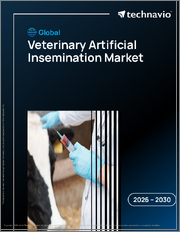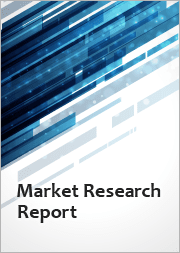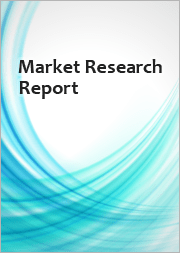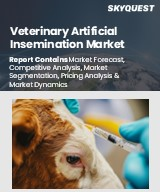
|
시장보고서
상품코드
1435224
동물 인공수정 : 시장 점유율 분석, 산업 동향 및 통계, 성장 예측(2024-2029년)Global Veterinary Artificial Insemination - Market Share Analysis, Industry Trends & Statistics, Growth Forecasts (2024 - 2029) |
||||||
세계 동물 인공수정 시장 규모는 2024년 47억 6,000만 달러로 추정되며, 2029년까지 65억 달러에 달할 것으로 예상되며, 예측 기간(2024-2029년) 동안 6.45%의 CAGR로 성장할 것으로 예상됩니다.
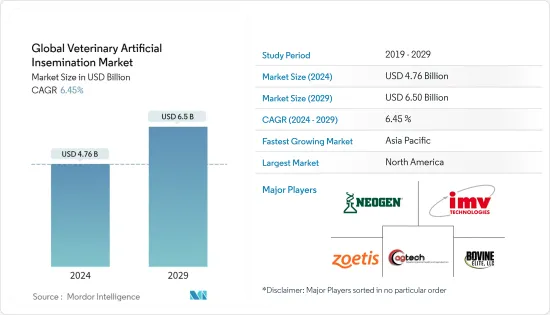
신종 코로나바이러스 감염증(COVID-19) 팬데믹은 여러 국가에서 수의학 분야를 포함한 다양한 부문에 심각한 악영향을 미치고 있습니다. 이로 인해 가축 및 가금류 가치사슬에 혼란이 발생하여 동물성 식품의 조달 및 판매 감소로 이어지고 있습니다. 적절한 사료와 수의학적 관리(적시 인공수정, 적시 임신 검사, 구충제 투여 등)의 부족으로 동물들이 고통받고 있으며, COVID-19로부터 농가와 종업원을 보호하기 위해 인도 축산국은 2020년 6월부터 가금류 사육 농가와 소유주에게 전화로 지원을 제공하는 프로그램을 시작 시작했습니다. 또한, COVID-19가 유행하는 동안 인공수정은 농가의 문앞에서 이루어졌습니다. 따라서 이러한 노력은 시장 성장에 기여하고 있습니다.
시장 성장을 이끄는 요인으로는 축산업과 수산업의 성장, 성병 부담 증가 등을 들 수 있습니다. 2022년 3월에 발표된 '소의 성병 통제'라는 제목의 기사에 따르면, 비브리오병과 소 트리코모나스증(트리코모나스증)과 같은 성병(STD)이 큰 문제로 대두되고 있으며, 이로 인해 생산 손실이 발생할 수 있습니다. 따라서 성병의 확산으로부터 가축을 보호하는 것이 시장을 촉진할 것으로 예상됩니다. 또한, 전 세계적으로 더 우수한 동물 품종에 대한 수요가 증가하고 있으며, 이에 따라 동물의 인공 수정에 대한 수요도 증가하고 있습니다. 또한, 전 세계적으로 인구 증가와 그에 따른 주거 비용 절감, 황소 사용 효율성 향상, 농부 및 동물 안전, 유전자 선택, 황소 취급 등의 이점이 향후 시장 성장을 촉진할 것으로 예상됩니다.
인공수정 기술은 수의학 동물들 사이에서 전염되는 많은 질병을 줄이는 데 도움이 됩니다. 이는 동물의 유전학 및 교배 측면에서 효율성을 향상시킵니다. 2022년 6월에 발표된 '인공수정 성공률, 첫 번째 수정 실패로 인한 생식 성적 및 경제적 영향: 후향적 연구'라는 제목의 기사에 따르면, 인공수정(AI)은 생식 능력을 향상시키는 최고의 기술로 인정받고 있으며, 에티오피아의 가축에 널리 적용되고 있습니다. AI의 성공 여부는 자궁내막 두께, 인공수정 시기, 수정 빈도, 난소 자극 프로토콜에 영향을 받습니다. 이는 인공수정(AI)에 대한 수요를 증가시켜 예측 기간 동안 시장 성장을 촉진할 것으로 예상됩니다.
또한 2021년 10월 유엔식량농업기구에 따르면 전 세계 인구의 약 50%가 생선을 식량으로 소비하고 있으며, 이로 인해 동물 생산량 증가의 필요성이 높아지고 있습니다. 따라서 이로 인해 동물 인공 수정에 대한 수요가 증가할 것으로 예상됩니다.
그러나 높은 장비 및 시술 비용으로 인해 예측 기간 동안 시장 성장이 억제될 것으로 예상됩니다.
동물 인공수정 시장 동향
동물병원 부문은 동물 인공수정 시장에서 큰 시장 점유율을 차지할 것으로 예상
동물병원 부문은 가축 사육두수 증가, 전염병 유병률 증가, 인공수정 기술 증가로 인해 시장이 크게 성장할 것으로 예상됩니다. 인도에서는 축산부가 COVID-19로부터 직원과 농가를 보호하기 위한 프로그램을 시작했으며, COVID-19 전염병이 유행하는 동안 동물병원은 최적의 위생 수준을 유지하기 위해 장갑, 마스크, 소독제, 바닥 세정제 등의 예방 조치를 취해 인공수정 서비스를 제공했습니다. 미국 ABC 동물병원은 COVID-19가 유행하는 동안 직원과 반려동물 보호자의 안전을 보장하기 위해 인공수정 서비스를 제공하고, COVID-19 감염을 예방하기 위한 새로운 절차를 도입했습니다.
전 세계적으로 인공수정 기술을 시행하는 병원의 수와 수의사 수가 증가하면서 시장 성장을 주도하고 있습니다. 예를 들어, 인도 축산, 낙농 및 수산부의 2020-2021 보고서에 따르면, 인도의 현장 기관은 소 개체군에 번식 서비스를 제공했습니다. 또한 소와 버팔로의 인공수정 서비스는 1회당 10루피의 비용으로 제공되었습니다. 2019년부터 2020년까지 총 4,888만 건의 인공수정이 이루어졌습니다.
또한, 동물이 밀접하게 접촉하거나 같은 환경을 공유하면 전염병이 확산될 수 있습니다. 예를 들어, 2019년 한국은 경기도 파주 양돈장에서 치명적인 아프리카돼지열병(ASF)의 첫 발병을 발견했습니다. 따라서 가축 질병은 가축 생산 시스템에서 일련의 문제를 일으키는 원인이 되기도 합니다. 이러한 문제에는 생산성 손실, 불확실한 식량 안보, 소득 손실 등이 포함되며, 이는 인간의 건강에도 악영향을 미칩니다. 따라서 향후 몇 년 동안 전염병 예방을 위해 인공 수정에 대한 수요가 증가할 것으로 예상됩니다.
따라서 이러한 요인들은 인공교배의 필요성을 증가시켜 동물 인공수정 시장에 긍정적인 영향을 미칠 것으로 예상됩니다.
아시아태평양은 예측 기간 동안 시장이 크게 성장할 것으로 예상
아시아태평양의 수의학 인공수정 시장의 성장을 이끄는 주요 요인으로는 동물 감염증의 증가와 인공수정에 대한 사람들의 인식이 높아지는 것을 들 수 있습니다. 아시아에서는 인도, 중국, 한국과 같은 국가들이 COVID-19 감염증의 확산으로 인해 심각한 영향을 받고 있습니다. 신종 코로나바이러스 감염증(COVID-19)이 유행하는 2020년 5월 인도에서 국가낙농개발위원회(NDDB)는 신종 코로나바이러스 감염증(COVID-19) 유행 기간 동안 유제품 가치사슬에서 따라야 할 절차에 대한 인식을 높이기 위해, 인터랙티브 웨비나를 시작했습니다. 또한 인공수정 및 번식 관리, 협동조합이 직면한 어려움, 농가에 대한 정기적인 지불 보장 등이 시장 성장을 촉진했습니다.
조류 인플루엔자는 닭, 메추라기, 반려용 조류 등 여러 종의 조류에 영향을 미치는 전염성이 강한 바이러스성 질병입니다. 예를 들어, 세계동물보건기구에 따르면 2021년 업데이트된 중요한 사실 데이터에 따르면 아시아 국가에서 조류인플루엔자는 가금류에 심각한 피해를 입히고 있습니다. 또한 동물 간 전염병 전파의 위험을 줄이기 위해 인공 수정의 도입이 증가하고 있습니다.
2019년 2월 Journal of Veterinary Medical Science에 게재된 MA Hannan 등의 연구 논문에 따르면, 일본에서 냉동정액을 이용한 인공수정으로 배아를 이식하는 것이 국산 말과 특수승용마의 생산성 향상에 도움이 되는 것으로 밝혀졌습니다. 인도 축산, 낙농 및 수산부의 2020-2021 보고서에 따르면, 인도는 수컷 송아지의 탄생에 관여하는 정자를 선별하여 제거한 후 암컷만 암수 분리하는 새로운 기술을 도입했습니다. 송아지가 태어납니다. 또한, 정부는 이러한 정액을 2,000회 분량의 정액으로 농가의 동물에 인공수정을 할 수 있는 새로운 기술을 시범적으로 도입할 것을 제안했습니다. 예를 들어, 2019년 8월 마드라스 수의과대학 산부인과 수의학과는 암수 정액으로 소의 인공수정을 시작했습니다. 따라서 위의 요인들은 이 지역의 시장 성장을 촉진할 것으로 예상됩니다.
동물 인공수정 산업 개요
동물 인공수정 시장에는 국제 기업과 국내 기업이 모두 존재하며 적당한 경쟁이 계속되고 있습니다. 동물 인공수정 시장의 주요 기업으로는 IMV Technologies, Neogen Corporation, Bovine Elite LLC, Agtech Inc., Zoetis Inc. 등이 있습니다.
기타 혜택
- 엑셀 형식의 시장 예측(ME) 시트
- 3개월간 애널리스트 지원
목차
제1장 서론
- 조사 가정과 시장 정의
- 조사 범위
제2장 조사 방법
제3장 주요 요약
제4장 시장 역학
- 시장 개요
- 시장 성장 촉진요인
- 축산·수산업 성장
- 동물 성병 부담 증가
- 시장 성장 억제요인
- 기기의 고비용
- 업계의 매력 - Porter's Five Forces 분석
- 구매자/소비자의 협상력
- 공급 기업의 교섭력
- 신규 참여업체의 위협
- 대체품의 위협
- 경쟁 기업 간의 경쟁 강도
제5장 시장 세분화
- 제품 유형별
- 기기
- 시약·키트
- 기타 제품 유형
- 최종사용자별
- 동물 병원
- 동물 클리닉
- 기타 최종사용자
- 지역별
- 북미
- 미국
- 캐나다
- 멕시코
- 유럽
- 독일
- 영국
- 프랑스
- 이탈리아
- 스페인
- 기타 유럽
- 아시아태평양
- 중국
- 일본
- 인도
- 호주
- 한국
- 기타 아시아태평양
- 중동 및 아프리카
- GCC
- 남아프리카공화국
- 기타 중동 및 아프리카
- 남미
- 브라질
- 아르헨티나
- 기타 남미
- 북미
제6장 경쟁 상황
- 기업 개요
- Bovine Elite LLC
- KRUUSE
- Agtech Inc.
- IMV Technologies
- Tek-Event
- Zoetis Inc.
- Neogen Corporation
- Iherdsman
- Swine Genetics International
- Select Sires Inc.
- GENEX Cooperative
- Genus PLC(ABS Global)
제7장 시장 기회와 향후 동향
ksm 24.03.06The Global Veterinary Artificial Insemination Market size is estimated at USD 4.76 billion in 2024, and is expected to reach USD 6.5 billion by 2029, growing at a CAGR of 6.45% during the forecast period (2024-2029).

The COVID-19 pandemic has created a significant adverse impact on different sectors, including the veterinary sectors in several countries. It has caused disruptions in livestock and poultry value chains, leading to a fall in the procurement and sale of animal-sourced food. Animals suffered due to a lack of adequate feed and veterinary care, such as the need for timely artificial insemination, timely pregnancy check, and de-worming. To safeguard farmers and employees against COVID-19, the Animal Husbandry Department of India launched a program in June 2020, which offered telephonic assistance to poultry farmers and owners. Additionally, artificial insemination was delivered to farmers at their doorstep during the COVID-19 pandemic. Therefore, such initiatives have contributed to market growth.
The factors driving the market growth include the growing animal and fishery industry and the increasing burden of sexually transmitted diseases. As per an article titled 'Controlling sexually transmitted diseases in cattle' published in March 2022, sexually transmitted diseases (STDs), such as vibriosis and bovine trichomoniasis (trich), can become a major problem and result in substantial production losses. Hence, protecting farm animals from the spread of sexually transmitted diseases is expected to drive the market. Furthermore, globally, the demand for the superior breed of animals is increasing, which, in turn, is increasing the demand for artificial insemination procedures in animals. Additionally, globally, the rising human population and associated advantages, such as decreased cost of housing, increased efficiency of bull usage, safety for farmers and animals, genetic selection, and handling of bulls, are anticipated to drive market growth in the future.
The artificial insemination technique helps reduce many of the transmitted diseases among veterinary animals. It allows greater efficiency in terms of genetics and crossbreeding of animals. As per an article titled 'Success rate of artificial insemination, reproductive performance and economic impact of the failure of first service insemination: a retrospective study' published in June 2022, artificial insemination (AI) is recognized as the best technique for increasing reproductive capacity and has received a widespread application in farm animals in Ethiopia. The success of AI is also influenced by endometrial thickness, artifcial insemination timing, insemination frequency, and ovarian stimulation protocols. This is expected to increase the demand for artificial insemination (AI) and drive market growth in the forecast period.
Furthermore, as per the Food and Agriculture Organization of the United Nations, October 2021, approximately 50% of the world's population consumes fish as food, which is driving the need for larger production of animals. Therefore, this is expected to boost the demand for veterinary artificial insemination.
However, the high cost of equipment and procedures is expected to restrain the market growth during the forecast period.
Veterinary Artificial Insemination Market Trends
The Veterinary Hospital Segment is Expected to Gain a Significant Market Share in the Veterinary Artificial Insemination Market
The veterinary hospital segment is expected to witness significant growth in the market, owing to the rising livestock population, higher prevalence of transmitting diseases, and increasing artificial insemination techniques. In India, Animal Husbandry Department launched a program to safeguard its employees and farmers against COVID-19. The veterinary hospitals provided artificial insemination services during the COVID-19 pandemic with preventive measures, such as gloves, masks, sanitizers, and floor cleaners, to maintain the optimal level of hygiene. In the United States, ABC Veterinary Hospital provided artificial insemination services by keeping staff and pet parents safe during the COVID-19 outbreak and implemented new procedures to prevent COVID-19 infection.
Globally, an increasing number of hospitals performing artificial insemination techniques and a rising number of veterinarians are driving the market growth. For instance, as per Animal Husbandry, Dairying and Fisheries Department 2020-2021 report, in India, field institutions of the department provided breeding services to the cattle population. Furthermore, an artificial insemination service was provided for cattle and buffaloes at the cost of INR 10 per insemination. A total of 48.88 lakh artificial inseminations were performed during the 2019-2020 period.
Furthermore, animals that are in close contact or share the same environment may result in the spreading of infectious diseases. For instance, in 2019, South Korea discovered its first outbreak of deadly African swine fever (ASF) at a pig farm in Paju, Gyeonggi Province, South Korea. Thus, livestock diseases are also contributing to a set of problems within livestock production systems. These problems include productivity losses, uncertain food security, and loss of income, among others, which are adversely affecting human health. Hence, in order to prevent infectious diseases, it is expected to raise demand for artificial insemination in the coming years.
Therefore, these factors are expected to drive the need for artificial mating and positively influence the veterinary artificial insemination market.
Asia-Pacific is Expected to Witness a Significant Growth in the Market During the Forecast Period
The major factors driving the veterinary artificial insemination market growth in the Asia-Pacific region include growing infectious diseases in animals and increasing awareness about artificial insemination among people. In Asia, countries, like India, China, and South Korea, are severely affected due to the COVID-19 outbreak. During the COVID-19 pandemic, in May 2020, in India, the National Dairy Development Board (NDDB) launched an interactive webinar to create awareness about procedures to be followed in the dairy value chain during the COVID-19 pandemic. Additionally, artificial insemination and breeding management, difficulties faced by co-operatives, and ensured regular payments to farmers have boosted the market growth.
Avian influenza is a highly contagious viral disease affecting several species of food-producing birds, such as chickens, quails, and pet birds. For instance, as per the World Organisation for Animal Health, key facts data updated in 2021, in Asia countries, Avian influenza continues to cause severe losses in poultry. Moreover, there is a rising in the adoption of artificial insemination to reduce the risk of infectious disease transmission among veterinary animals.
According to a research article by M A Hannan et al., published in the Journal of Veterinary Medical Science in February 2019, embryo transfer in Japan by artificial insemination using frozen semen was found to be useful in improving the productivity of Japanese domestic and special riding horses. As per Animal Husbandry, Dairying and Fisheries Department 2020-2021 report, in India, the department introduced the new technology of sexing the semen by which the sperm responsible for the birth of male calves are sorted and eliminated, and as a consequence, only female calves are produced. Additionally, the government has proposed to adopt new technology by using 2,000 numbers of such semen doses, which may be used for artificial insemination in the farmer's animals on a pilot basis. For instance, in August 2019, Obstetrics of Madras Veterinary College and the Department of Veterinary, Gynecology started artificial insemination in cattle using sexed semen. Hence, the factors mentioned above are expected to fuel the market growth in the region.
Veterinary Artificial Insemination Industry Overview
The veterinary artificial insemination market is moderately competitive, with the presence of both international and local companies. Some of the companies in the veterinary artificial insemination market are IMV Technologies, Neogen Corporation, Bovine Elite LLC, Agtech Inc., and Zoetis Inc., among others.
Additional Benefits:
- The market estimate (ME) sheet in Excel format
- 3 months of analyst support
TABLE OF CONTENTS
1 INTRODUCTION
- 1.1 Study Assumptions and Market Definition
- 1.2 Scope of the Study
2 RESEARCH METHODOLOGY
3 EXECUTIVE SUMMARY
4 MARKET DYNAMICS
- 4.1 Market Overview
- 4.2 Market Drivers
- 4.2.1 Growing Animal Husbandry and Fishery Industry
- 4.2.2 Increasing Burden of Venereal Diseases in Animals
- 4.3 Market Restraints
- 4.3.1 High Cost of Equipment
- 4.4 Industry Attractiveness - Porter's Five Forces Analysis
- 4.4.1 Bargaining Power of Buyers/Consumers
- 4.4.2 Bargaining Power of Suppliers
- 4.4.3 Threat of New Entrants
- 4.4.4 Threat of Substitute Products
- 4.4.5 Intensity of Competitive Rivalry
5 MARKET SEGMENTATION
- 5.1 By Product Type
- 5.1.1 Equipment
- 5.1.2 Reagents and Kits
- 5.1.3 Other Product Types
- 5.2 By End User
- 5.2.1 Veterinary Hospitals
- 5.2.2 Veterinary Clinics
- 5.2.3 Other End Users
- 5.3 By Geography
- 5.3.1 North America
- 5.3.1.1 United States
- 5.3.1.2 Canada
- 5.3.1.3 Mexico
- 5.3.2 Europe
- 5.3.2.1 Germany
- 5.3.2.2 United Kingdom
- 5.3.2.3 France
- 5.3.2.4 Italy
- 5.3.2.5 Spain
- 5.3.2.6 Rest of Europe
- 5.3.3 Asia Pacific
- 5.3.3.1 China
- 5.3.3.2 Japan
- 5.3.3.3 India
- 5.3.3.4 Australia
- 5.3.3.5 South Korea
- 5.3.3.6 Rest of Asia Pacific
- 5.3.4 Middle-East and Africa
- 5.3.4.1 GCC
- 5.3.4.2 South Africa
- 5.3.4.3 Rest of Middle-East and Africa
- 5.3.5 South America
- 5.3.5.1 Brazil
- 5.3.5.2 Argentina
- 5.3.5.3 Rest of South America
- 5.3.1 North America
6 COMPETITIVE LANDSCAPE
- 6.1 Company Profiles
- 6.1.1 Bovine Elite LLC
- 6.1.2 KRUUSE
- 6.1.3 Agtech Inc.
- 6.1.4 IMV Technologies
- 6.1.5 Tek-Event
- 6.1.6 Zoetis Inc.
- 6.1.7 Neogen Corporation
- 6.1.8 Iherdsman
- 6.1.9 Swine Genetics International
- 6.1.10 Select Sires Inc.
- 6.1.11 GENEX Cooperative
- 6.1.12 Genus PLC (ABS Global)




